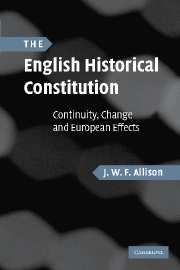Book contents
- Frontmatter
- Contents
- Table of Cases
- Preface
- 1 Introduction
- 2 A historical constitutional approach
- 3 The Crown: evolution through institutional change and conservation
- 4 The separation of powers as a customary practice
- 5 Parliamentary sovereignty and the European Community: the economy of the common law
- 6 The brief rule of a controlling common law
- 7 Dicey's progressive and reactionary rule of law
- 8 Beyond Dicey
- Conclusions and implications
- Bibliography
- Index
2 - A historical constitutional approach
Published online by Cambridge University Press: 18 December 2009
- Frontmatter
- Contents
- Table of Cases
- Preface
- 1 Introduction
- 2 A historical constitutional approach
- 3 The Crown: evolution through institutional change and conservation
- 4 The separation of powers as a customary practice
- 5 Parliamentary sovereignty and the European Community: the economy of the common law
- 6 The brief rule of a controlling common law
- 7 Dicey's progressive and reactionary rule of law
- 8 Beyond Dicey
- Conclusions and implications
- Bibliography
- Index
Summary
Amidst competing notions of the constitution and various approaches to understanding it or addressing related concerns, any notion or approach requires justification. For much of the twentieth century, Dicey's analytical approach, if not necessarily the content of his analysis, predominated but, I will suggest, proved significantly problematic. In this chapter, I advocate a historical constitutional approach through a reorientation of Dicey and in relation to other approaches that are prominent in current constitutional debates.
Dicey's analytical approach
In Law of the Constitution, Dicey described his approach to the subject of constitutional law in considerable detail. He famously presented his professorial duty as that of an expounder:
At the present day students of the constitution wish neither to criticise, nor to venerate, but to understand; and a professor whose duty it is to lecture on constitutional law, must feel that he is called upon to perform the part neither of a critic nor of an apologist, nor of an eulogist, but simply of an expounder; his duty is neither to attack nor to defend the constitution, but simply to explain its laws.
He expressly distinguished the legal from the historical view of the constitution. He relegated the historical view in legal study so that lawyers might properly study ‘the law as it now stands’ and not ‘think so much of the way in which an institution has come to be what it is, that they cease to consider with sufficient care what it is that an institution has become’.
- Type
- Chapter
- Information
- The English Historical ConstitutionContinuity, Change and European Effects, pp. 7 - 45Publisher: Cambridge University PressPrint publication year: 2007
- 1
- Cited by



